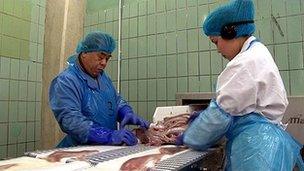Iceland dismisses prospect of mackerel wrangle sanctions
- Published
Most of the Iceland catch is exported
The fishing industry in Iceland is shrugging off the prospect of European trade sanctions if it continues to over-fish one of Scotland's most valuable stocks.
The EU has agreed a package of measures against the country - and its neighbour, the Faroe Islands - for use if they do not stop fishing significant quantities of mackerel.
But, in Iceland, there is a feeling the sanctions would have almost no impact.
HB Grandi is one of Iceland's biggest fish processing firms, handling about 20,000 tonnes of fish each year.
Like almost everything sourced by the country's fleet, most of the catch is exported to foreign nations.
Its biggest market is Russia and the UK accounts for about 11% of sales.
There is little fear of EU trade sanctions and a feeling that, at worst, it would simply displace rather than kill the market.
The company's chief executive officer, Vilhjalmur Vilhjalmsson, told BBC Scotland: "The UK would import cod from other countries to fulfil the demand, that cod would come through other channels and we would go to that channel instead."
With such a small population, around 320,000, Iceland's fleet relies on exports.
The sanctions would close off the European market and - the EU hopes - force the country to strike a deal.
However, Iceland's industry minister, Steingrimur Sigfusson, insists he will not be threatened.
"The sanctions would be damaging but most of all damaging to the atmosphere - they would deteriorate the situation in terms of possibilities to solve this," he said.
Mr Sigfusson added defiantly: "But the sanctions will not break Iceland."
Gun boats
The Odinn, on display at the capital's maritime museum, is a symbol of the last fight over fish.
It is the coastguard gun boat that rammed British trawlers to force them out of what are now their exclusive waters.

Iceland has a population of about 320,000 people
Clearly, this is now a battle of wills rather than a war of actions, but the Odinn's activities in the Cod Wars demonstrates how cast iron Iceland's will is.
Environmental groups work tirelessly to protect the mountains and the seas.
Overfishing of mackerel is of great concern to them.
However, the chairman of the Iceland Nature Conservation Association, Arni Finnsson, believes sanctions would never be used by the European Union.
"Economic sanction is something you do against Syria or the former government of Libya," he said.
"Iceland is a naval country, a friendly nation. It's not likely."
In recent weeks, Scotland's fishing minister, Richard Lochhead, has moved away from calling for sanctions, instead urging independent mediation to sort this growing dispute.
- Published11 February 2013
- Published6 February 2013
- Published3 February 2013
- Published28 January 2013
- Published15 January 2013
- Published12 January 2013